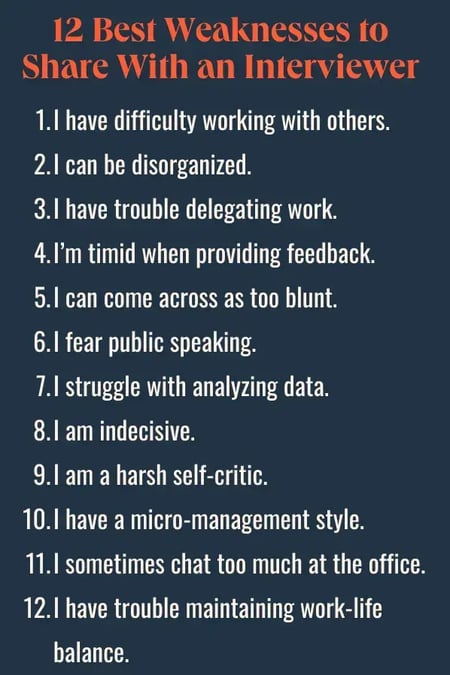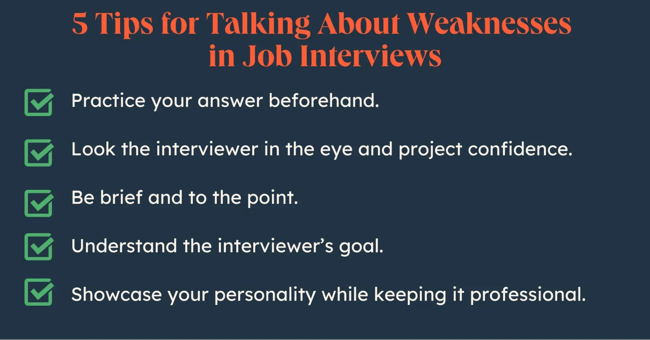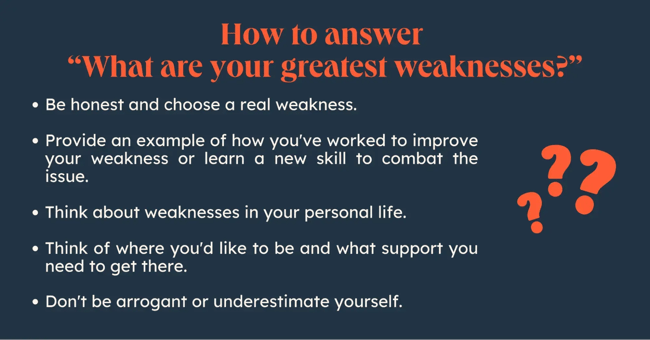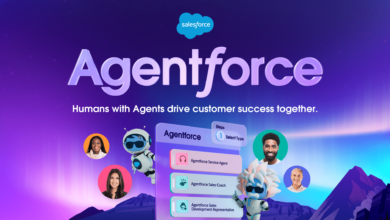What Are Good Weaknesses to Say in an Interview That Aren’t “I’m a Perfectionist”?

I’ve been told countless times that the hardest part about getting a job at my dream company (Nickelodeon — spoiler alert, I got it!) is getting my foot in the door.

I refreshed my resume and practiced answering many common interview questions, including “What is your greatest weakness?” This question never fails to trip me up, as it often feels like a trick or test. I’m trying to sell myself at the highest caliber, and you want me to say what’s wrong with me?
The key is finding the perfect balance between being able to admit that no one is perfect and not listing weaknesses that would prevent you from succeeding at the role. Here, I’ve cultivated some incredible answers to “What is your greatest weakness?” — and don‘t worry, these answers aren’t, “I’m a perfectionist.”
Table of Contents
What are good weaknesses to say in an interview?
Interviewers who ask, “What is your greatest weakness?” want to know how honest and self-aware you are.
Before you answer, ask yourself:
What are my weaknesses?
How did I notice this weakness in myself?
How did I react to that realization?
What steps am I taking to notice that habit at the moment?
What am I doing to change this behavior?
The best answers to this question sincerely explain a weakness and provide an example of how you are actively working to improve.
Pro tip: I also asked Nehal Patel, the director of research technology and innovation and hiring manager at Smith & Nephew, how to nail this question:
He said, “Good areas to point to for this question are organizational skills that can improve as new tools become available, or interpersonal skills that can continuously advance as you work with new people with different styles.”
12 Best Weaknesses to Share With an Interviewer
I have difficulty working with others.
I can be disorganized.
I have trouble delegating work.
I’m timid when providing feedback.
I can come across as too blunt.
I fear public speaking.
I struggle with analyzing data.
I am indecisive.
I am a harsh self-critic.
I have a micro-management style.
I sometimes chat too much with my colleagues.
I have trouble maintaining a work-life balance.
Here are some of my favorite examples of how to answer “What is your greatest weakness?” and why they work.

1. I have difficulty working with others.
“I can struggle when working with a team — I am incredibly self-sufficient, so it‘s difficult to rely on others to complete my work. That’s why I‘ve pursued roles that require someone to work independently. However, I’ve also worked to improve this weakness by enrolling in team-building workshops. While I typically work independently, I must learn to trust my coworkers and ask for outside help when necessary.”
This answer works because the weakness — the inability to work well with a team — doesn‘t hinder your ability to perform well in the role, since it’s a job that doesn’t rely on teamwork to succeed. Additionally, you display an eagerness to develop strategies to combat your weakness, which is a critical workplace skill.
Related Resources:
2. I can be disorganized.
“I struggle with organization. While it has yet to impact my performance, I‘ve noticed my messy desk and cluttered inbox interfere with my efficiency. Over time, I’ve learned to set aside time to organize my physical and digital space, and I’ve seen it improve my efficiency levels throughout the week.”
I am the biggest culprit of a messy workspace. This answer works because it‘s a relatable and fixable weakness. You note that disorganization doesn’t interfere with your ability to do your job, which is critical, but you also acknowledge it might make you less efficient.
Related Resources:
3. I have trouble delegating work.
“I sometimes find it difficult to delegate responsibility when I can finish the task well myself. However, when I became manager in my last role, it became imperative I learn to delegate tasks to ease some of the work off of my plate while allowing my direct reports to take on more responsibility. To maintain a sense of control when delegating tasks, I implemented a project management system to oversee the progress of a project. This system enabled me to improve my ability to delegate efficiently.”
This answer works because it suggests you’re capable of flexibility, which is critical for long-term growth. Additionally, you showcase a level of initiative and leadership when you mention the successful implementation of a new process that enabled you to succeed in your past role, despite your weakness.
Related Resources:
4. I’m timid when providing feedback.
“Often, I can be timid when providing constructive feedback to coworkers or managers, out of fear of hurting someone‘s feelings. However, in my last role, my coworker asked me to edit some of his pieces and provide feedback for areas of improvement. Through my experience with him, I realized feedback can be helpful and kind when delivered correctly. Since then, I’ve become better at offering feedback and realized I can use empathy to provide thoughtful, productive feedback.”
While interning at the HubSpot Blog, I copyedited guest writers’ posts. I always wondered why I, a college student, had the right to provide detailed feedback to a professional writer.
With time, I’ve learned that constructive feedback is always beneficial to people when presented respectfully, regardless of their level or experience.
This answer works because you’ve explained how you could turn a weakness into a strength through real-world experience.
Related Resources:
5. I can come across as too blunt.
“My blunt, straightforward nature has allowed me to succeed over the years as a team manager, because I can get things done efficiently, and people often appreciate my honesty. However, I’ve recognized my bluntness doesn’t always serve my employees well when delivering feedback. To combat this, I’ve worked to develop empathy and deeper relationships with those I manage. Additionally, I took an online leadership management course, and worked with the professor to develop my ability to deliver feedback.”
Facets of our personalities can help us in certain areas of our work while hindering us in others. In this example, you first explain how your blunt nature allows you to be successful in certain situations. Then, you mention how it can be seen as a lack of empathy, and you provide examples of how you’re trying to solve this issue.
It works because you’re demonstrating an ability to recognize when your personality interferes with the functions of your role, and how you can solve for that.
Related Resources:
6. I fear public speaking.
“Public speaking makes me nervous. While I don‘t need to do much public speaking as a web designer, I still feel that it’s an important skill — especially when I want to offer my opinion during a meeting. To combat this, I spoke with my manager and she recommended I speak at each team meeting for a few minutes about our project timeline, deadlines, and goals when developing a website for a client. This practice has enabled me to relax and see public speaking as an opportunity to help my team members do their jobs effectively.”
In this example, you mention qualities that don’t apply to the role, but which you nonetheless have been working to improve. This works because it shows your desire to meet more business needs than necessary in your current role — and that speaks to your professional ambition.
Related Resources:
7. I struggle with analyzing data.
“I‘m not great at analyzing data or numbers. However, I recognize this flaw can prevent me from understanding how my content performs online. In my last role, I set up monthly meetings with the SEO manager to discuss analytics and how our posts were performing. Additionally, I received my Google Analytics certificate, and I make it a point to analyze data related to our blog regularly. I’ve become much more comfortable analyzing data through these efforts.”
As someone creative-minded, I also struggle with the data side of my work. For example, understanding how marketing campaigns perform and incorporating those results into our campaign strategy is an important part of my job, even though there are teams who specifically handle that data.
I like this example because it shows your desire to go above and beyond a job description and better understand the needs of the whole department, rather than just your role.
Related Resources:
8. I am indecisive.
“Sometimes I struggle with ambiguity and making decisions when directions aren‘t clear. I come from a work environment that always gave clear and direct instructions. I had such a strong team and leadership that I haven’t had much practice making decisions in the heat of the moment. I’m working on this by leaning more into my experience and practicing listening to my gut.”
This job interview answer works because you demonstrate that you can both follow a leader and become one yourself. It‘s all right not to know what to do in the moment. Admitting that you relied on strong leadership shows that you know when to step up and when to seek direction.
Related Resources:
9. I am a harsh self-critic.
“My inner critic can be debilitating at times. I take pride in producing good work, but I don’t always feel satisfied with it, which has led to burnout. However, I‘ve started pushing back against this inner voice by caring for myself before and after work. I’m also learning to recognize when my inner critic is right and when I need to dismiss it.”
Your interviewer can likely relate to this weakness; we all have harsh inner critics (mine often leaves me spiraling after sending any mildly assertive email or Slack).
It‘s also effective because 1) It shows that you’re willing to work on your weaknesses outside of work, not just during business hours, and 2) It demonstrates your inner critic may have valid points.
Related Resources:
10. I have a micro-management style.
“I used to work in industries where I had to cultivate a solid work ethic in my employees. This training style has been so ingrained in me that I still need to distinguish who may need that coaching and who does not. I‘ve been reading books on effective delegation and team building to work on this shortcoming. One technique that works for me is reassuring myself that if I establish clear expectations, my team will heed them. I’ve also learned to trust my team members more.”
This answer works best if you’ve held a leadership position before and are applying for a managerial role.
While you may be used to running your crew or team a specific way, this indicates that you‘re willing to admit when your method isn’t the most effective.
Showing your flexibility demonstrates your ability to grow and adapt to a new culture at a new job.
Related Resources:
11. I sometimes chat too much with my colleagues.
“I enjoy developing a relationship with my coworkers by engaging in conversation, and that‘s a great team-building skill. However, I habitually carry on a conversation to a point where it may distract other coworkers. I have learned since then that there are other ways to connect with my coworkers and that if I’m asking about their day, I need to keep it brief and redirect myself back to my work.”
Please stand up if you also came home with report cards in your school days stating, “[Name] is a great student, but talks too much in class,” and somehow still have that issue as an adult!
This answer works because it shows awareness of how your talkative tendencies may be distracting in the workplace. You’re also telling your future employer that you’re willing to build relationships with coworkers but not at the cost of productivity.
That’s what sets us apart from our innocent, talkative childhood selves.
Related Resources:
12. I have trouble maintaining a work-life balance.
“I‘ve struggled with work-life balance, especially after I started working remotely during the pandemic. This increased my stress levels to the point where my productivity was at an all-time low, and I didn’t bring my best self to work. Because I want to continue working remotely, I‘ve added better structure to my day and instituted a sharp start and end time. I’ve already seen improvements in my levels of focus during work hours.”
At first, this might seem like a “strength” masquerading as a weakness — pouring yourself into work is great, right? That means you love your job. But it’s not so great if it impacts your productivity and your relationships with coworkers.
This answer works because it doesn‘t mean, “I work so much that my home life suffers.” It implies, “I work a lot to the point of burnout, and I’ve realized that I need to structure my day better.”
Related Resources:
Other Common Interview Weaknesses
Need more inspiration? Here are some other common weaknesses you can consider mentioning in a job interview.
“What Are Your Weaknesses?” Examples
Organizational Weaknesses:
Struggling with time management.
Managing missed deadlines.
Not being able to prioritize multiple tasks at a time.
Delaying tasks unnecessarily.
Quality of Work Weaknesses:
Having limited experience in a specific skill or specialization.
Having trouble adapting to new processes or technologies.
Striving for perfection.
Finding it hard to let go of projects.
Interpersonal Weaknesses:
Issues communicating with colleagues of higher titles.
Difficulty working with different personalities.
Difficulty delegating tasks.
Challenges asking for help.
Personal Growth Weaknesses:
Balancing work and personal life.
Struggling to say “no.”
Being hesitant to speak up or advocate for yourself.
Lacking self-assurance.
Avoiding taking responsibility for mistakes.
Being late occasionally.
How to Identify Your Greatest Weakness
My top piece of advice for identifying your greatest weakness in an interview is this: Answer honestly but don’t threaten your chance at getting the job offer.
Here’s how to do just that.
1. Rule out any skills that are listed in the job description.
Scan every word of the job listing to ensure the weakness isn’t included in the required skills and responsibilities.
For example, my job description at Nickelodeon mentioned looking for a candidate who could build relationships with partners at all levels. Since that is an essential qualification for the role, I wouldn’t have answered “What is your greatest weakness?” with “Communicating with colleagues of higher titles.”
2. Consider weaknesses that you have overcome.
I spoke with Sneha Alagappan, the assistant director of computer science career services at the University of Chicago and a former tech recruiter, and she mentioned the idea of highlighting weaknesses that you’re already tackling:
“There is always a positive way to spin potential mistakes and areas of opportunity for yourself by talking about lessons you’ve learned along the way and how you have already changed your way of working moving forward.
[For example,] if your weakness is ‘organization,’ give an example of a time when you identified your weaker organization skills and reflected that it was holding you back in some way, and how you worked to overcome that [weakness] moving forward.”3. Find inspiration by looking through old performance reviews.
If you’re struggling with a specific weakness example, read through old self-assessments and performance reviews. These documents are great sources of inspiration for examples of your accomplishments and areas you can improve.
Alagappan agrees, adding, “Receiving feedback from a direct manager, skip-level managers, peers, or cross-functional partners is a great way to identify your areas of opportunity.”
One of my first performance reviews at Nickelodeon mentioned I should speak up more during meetings. Since then, I have come to lead several bi-weekly and monthly meetings, which I did because of the encouragement from my manager.
How to Answer “What Are Your Greatest Weaknesses?”
1. Be honest and choose a real weakness.
The answer, “I’m a perfectionist” won‘t cut it because it’s not a real weakness.
Perfectionism can never be attained — it’s a fear-based pattern that leads to short-term rewards like getting the job done early and exceeding expectations but can ultimately lead to burnout.
Instead, choose a real weakness. Underneath the desire to do perfect work may lie a more authentic weakness like trouble asking for help or reluctance to delegate.
2. Provide an example of how you’ve worked to improve your weakness or learn a new skill to combat the issue.
Hiring managers don’t expect you to overcome your weaknesses overnight. As Patel told me, “Hiring managers are normal people with their own shortcomings, too.”
Everyone has areas they must continuously work on to keep their skills sharp, so show the interviewer that you’re aware of your weak points and working to improve.
3. Think about weaknesses in your personal life.
Humanizing yourself in the interview allows your interviewer to connect and visualize working with you in the future. It’s not just about weaknesses that pertain to the job.
In my personal life, I have trouble saying “no” to friends. This is a relatable weakness in both work and life. Demonstrating your self-awareness this way shows that you understand that self-improvement correlates to work performance.
4. Think of where you’d like to be and what support you need to get there.
Overall, growth is a part of life. Think about people you look up to that may be related to the field that you’re in. Ask yourself what character traits those people have and what work you might need to do to get there.
For example, I’m inspired by my manager who I believe strikes the perfect balance between self-assuredness and kindness. I know I can achieve this by making myself heard in meetings and listening to my gut even when others may think differently.
5. Don’t be arrogant or underestimate yourself.
The most important thing when responding to the question “What is your greatest weakness?” is to exhibit confidence in your answer. Luckily, confidence can be learned — it begins with being honest with yourself and knowing you’re being truthful in what you say.
If you‘ve identified an area of weakness and feel sure about it, let that assurance shine through in your answer. As I’ve mentioned, everyone has areas of improvement, so there’s no need to feel embarrassed about something you struggle with that you’re working to refine.
5 Tips for Talking About Weaknesses in Job Interviews
Now that you know the most effective answers and best practices for choosing a weakness, it’s time for the true test: delivering the answer to the interviewer.
This doesn’t have to be panic-inducing — I like to imagine talking through this question with my best friend.
Here are five tips I follow to eliminate some of the fear:
Practice your answer beforehand. I prefer practicing interview questions like this one with friends so I can receive live feedback, but practicing aloud to yourself in a mirror can be equally effective.
Look the interviewer in the eye and project confidence. I can relate to how difficult it is to feel secure while discussing your weaknesses. I manage this by not necessarily being confident in my weakness, but confident in my conveyance of said weakness.
Be brief and to the point. I typically prepare a response between thirty seconds and one minute long. The first statement should directly state your weakness, and the rest of the answer should highlight how you’re overcoming it.
Understand the interviewer’s goal. The “What is your greatest weakness?” question isn’t meant to disqualify you. It’s just another way for interviewers to learn your soft personal and professional attributes.
Showcase your personality while keeping it professional. I like to infuse some humor into interviews. It helps take the edge off the nerves and helps me build more of a connection with the hiring manager.

Note: These tips also apply to other common interview questions like “How do you handle conflict?” or “What motivates you?” So, be sure to plan accordingly. Don’t worry, we’ve compiled a comprehensive list of questions for easy prepping).
There’s Strength in Every Weakness
I’m human, too — and it has always been difficult for me to vocalize my weaknesses in an interview setting where I already feel my most vulnerable. But I’ve learned that every weakness also has a strength on its flipside.
Leaning on your teammates who excel in your weak areas is a great way to show that you‘ll work well on the team and know how to use your resources to solve problems. Taking free online courses to progress your professional development indicates you’re willing to work toward improvement.
No matter which of these answers you share with the hiring team, so long as you are genuine in your approach, they’ll be more than happy to help you grow and exceed the expectations of the role.
Editor’s note: This post was originally published in December 2018 and has been updated for comprehensiveness.
![Free Guide: 50 Common Interview Questions [Download Now]](/wp-content/uploads/How-to-Answer-‘What-Makes-You-Unique-amp-Stand-Out.png)




